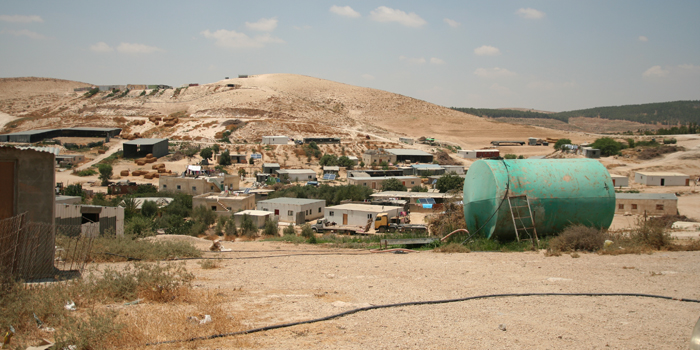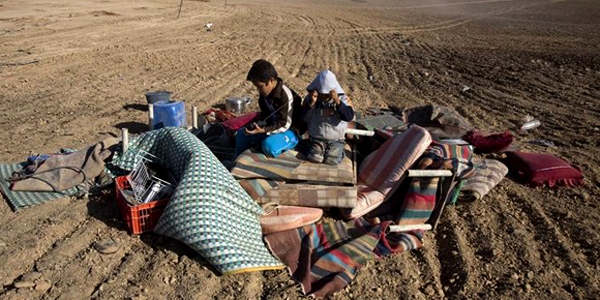Two years since Prawer...What's next? Adalah Report
 Sunday, October 27, 2013 at 11:38PM
Sunday, October 27, 2013 at 11:38PM 
by Dr Thabet Abu Rass Adalah, Naqab Office
September 2013
http://www.adalah.org/eng/Articles/2204/Two-years-since-Prawer...Whats-next-An-Article-by
11 September 2013 marks two years since the Israeli government approved the Prawer Plan. The plan intends to uproot tens of thousands of Arab Bedouin citizens of Israel from their villages, to demolish their homes, and to confiscate an overwhelming majority of their lands. The government proposed this plan as a legislative bill, which has already passed its first reading in the Knesset in June 2013.
It has been two years of back and forth between the Israeli government and its agencies on one side, and the Arab Bedouin citizens on the other. The government intended to pass the law swiftly in the Knesset within six months of authorizing the Prawer Plan, but then found itself facing the steadfast resistance of the people in the Naqab, who are determined to stop the plan.
In response to condemnation by the local Arab and the international community, the government called on former Minister Benny Begin to “listen to” the opinions of the Bedouin residents of the unrecognized villages and the landowners who opposed the confiscation of their lands. In reality, Begin’s undertaking was to market the plan and later to relay to his peers in the Israeli government that it would be difficult to pass the plan in its current form. Therefore, he proposed trivial amendments, which bore the appearance of great significance but in reality were meaningless. These amendments included shortening the plan's implementation period from five to three years, a slight increase in the land compensation that would be allotted to those dispossessed of their lands, and a decrease in financial compensation.
Although the Prawer Plan bill faces two more rounds of votes in the Knesset to become law, the Israeli government is not waiting for the bill to pass; it is already implementing it on the ground every day. Devastating home demolitions have become the government’s tactic of choice to displace the Bedouin community. In a response to a freedom of information request from Adalah, the Interior Ministry wrote of its “successful” demolition of 862 homes in 2012, including 449 that were demolished by their owners, who were threatened with heavy fines if they did not self-demolish their homes. So far in 2013, the Israeli authorities have demolished 399 homes, 187 of which were self-demolished.

In tandem with the passing of the Prawer Bill and its de facto implementation, the Israeli government has increased its incitement campaign against the Bedouin. The campaign has become part of a pervasive culture of incitement, and is one waged against the larger Arab population. The campaign of myths and misinformation aims to criminalize a community that has been marginalized since the state’s establishment. The government lies when it claims that the Bedouin control all of the land of the Naqab, going so far as to say that “The Arabs occupy the Naqab”, knowing full well that they settle on and use just 2% of its total area. The government publically accuses the Arabs of the Naqab of building illegally, yet the media fails to mention that the government refuses to acknowledge or approve plans for villages that existed well before the State of Israel.
The racist misinformation campaign is widespread and exploited in myriad circumstances by government officials, the media, and right-wing organizations. More than a month ago, the Israeli Minister of Public Security, Yitzhak Aharonovitch, in an attempt to convince the government to allocate funds for his ministry, warned that the Bedouin would take up arms and use them against the police when forced off their land. Preceding this, in another case of racial incitement, the media automatically reported that a criminal who opened fire on civilians at the Bank HaPoalim in Be'er el-Sebe was a Bedouin man, although he was Jewish.
Last month, in a lengthy article in Ma’ariv, journalist Shlomo Afergan described the Bedouin tribes as criminal families, and throughout the article, he used military and security terms. For example, he called the al-Azazmeh tribe “frightening” and “the most dangerous among the Bedouin criminal organizations,” controlling “the most crucial strategic roads in Israel.” These roads include “open firing zones, army camps, gas and oil lines, and lands used by the Israeli Air Force for operations in the Naqab and region.” Some Israeli media and organizations also tried to connect the Bedouin in the Naqab to recent events in the Sinai, and accused some of the youth who were peacefully protesting the Prawer Plan in August of raising the flag of Al-Qaeda. This inflammatory rhetoric aims to delegitimize the Bedouin and undermine their attempts to stop the Prawer Plan.
In the face of this, the Bedouin remain steadfast in their struggle to remain on their land through ongoing and varied efforts supported by civil society and the international community. In response to the Prawer Plan, the Regional Council of the Unrecognized Villages, together with Bimkom and Sidreh, proposed an Alternative Plan that includes recognition of all the Bedouin villages. Due to intense advocacy by human rights organizations, civil society, and the Arab political leadership, the Prawer Plan has also become the subject of international attention. Adalah and its NGO partners are responsible for statements from both the European Union and United Nations that condemn the Prawer Plan and call on the Israeli government to reconsider it.
These persistent efforts are having an impact, and even in the Knesset – where the government enjoys a clear majority – the racist law passed its first reading by only three votes. However, if the law does pass the two subsequent readings, Adalah's lawyers and other legal organizations will challenge it in the Supreme Court.
The public and communal struggle and the steadfastness of the people in the villages was and is a cornerstone of the failure of the Prawer Plan. The High Steering Committee for Arabs in the Naqab, an emerging arm of the Arab High Follow-Up Committee, has supported the people’s efforts over the last two years by organizing intense activities against the Plan, culminating in loud, well-attended demonstrations in Be'er el-Sabe and Jerusalem. These demonstrations benefit as well from the support of Israeli Jewish allies who advocate for Bedouin rights.
The Bedouin community leadership and all Arab political actors are pursuing the total repeal of the Prawer Plan, and not simply a discussion about its details, as the gap between the government’s proposal and the people’s demands for their basic rights to their historical lands and for the recognition of their villages is immense.
Unfortunately, the political parties and movements opposing this plan have become a bit sluggish recently, and appear to be preoccupied with regional events. However, demanding justice in the Naqab cannot wait; a unified alliance must raise it. In the past, we have called for it, and we continue to call for it today: Join us and help us stop the Prawer Plan before it is too late.
Dr. Thabet Abu Rass is the Director of Adalah's Naqab Office.
 APJP |
APJP |  Post a Comment |
Post a Comment |
Reader Comments